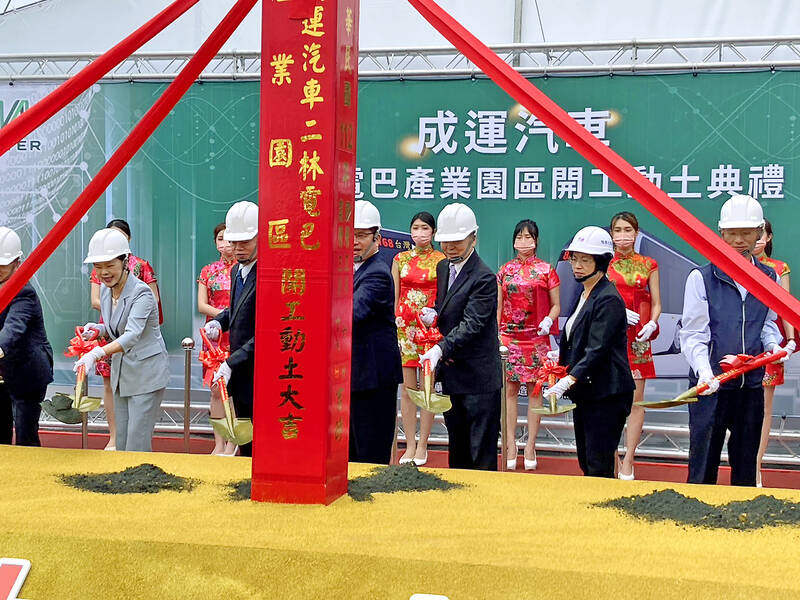Master Transportation Bus Manufacturing Ltd (成運汽車) on Sunday broke ground for a new manufacturing complex in Changhua County.
The electric bus maker plans to finish the construction before the end of next year.
The 20 hectare complex would cost NT$1.8 billion to NT$2.5 billion (US$58.68 million to US$81.50 million) and would generate up to NT$500 billion in output value, the company said.

Photo: Yen Hung-chun, Taipei Times
The complex is being built in the Central Taiwan Science Park’s (中部科學園區) campus in Changhua County’s Erlin Township (二林). The science park approved Master Transportation’s investment plan in August 2021, with the goal of creating a supply chain to manufacture electric buses for local and foreign markets.
The complex is to include a research and development center, an automated battery module, an automatic battery pack production plant, an automated beam smart manufacturing center, a body chassis plant and an overseas delivery center, among other facilities, the company said.
At Sunday’s groundbreaking ceremony, Minister of Economic Affairs Wang Mei-hua (王美花) said she hopes Master Transportation will become a global player in the electric bus sector by partnering with local electronics and electrical machinery companies.
Master Transportation is headquartered in Taipei, with a factory in Pingtung County’s Sinyuan Township (新園).
The company is in talks with 47 Taiwanese firms to discuss potential collaboration, chairman Wu Ding-fa (吳定發) said.
It is seeking partnerships with Taiwan’s Formosa Plastics Group (台塑集團), Tatung Co (大同) and Teco Electric & Machinery Co (東元電機), as well as its battery supplier, Japan’s Toshiba Corp, Wu said.
Wu said Master Transportation would try to leverage its relationship with Toshiba to export Taiwan-made electric buses to Japan, adding that the firm is setting its sights on showcasing its products at Expo 2025 in Osaka.

Taiwan Semiconductor Manufacturing Co (TSMC, 台積電) would not produce its most advanced technologies in the US next year, Minister of Economic Affairs J.W. Kuo (郭智輝) said yesterday. Kuo made the comment during an appearance at the legislature, hours after the chipmaker announced that it would invest an additional US$100 billion to expand its manufacturing operations in the US. Asked by Taiwan People’s Party Legislator-at-large Chang Chi-kai (張啟楷) if TSMC would allow its most advanced technologies, the yet-to-be-released 2-nanometer and 1.6-nanometer processes, to go to the US in the near term, Kuo denied it. TSMC recently opened its first US factory, which produces 4-nanometer

PROTECTION: The investigation, which takes aim at exporters such as Canada, Germany and Brazil, came days after Trump unveiled tariff hikes on steel and aluminum products US President Donald Trump on Saturday ordered a probe into potential tariffs on lumber imports — a move threatening to stoke trade tensions — while also pushing for a domestic supply boost. Trump signed an executive order instructing US Secretary of Commerce Howard Lutnick to begin an investigation “to determine the effects on the national security of imports of timber, lumber and their derivative products.” The study might result in new tariffs being imposed, which would pile on top of existing levies. The investigation takes aim at exporters like Canada, Germany and Brazil, with White House officials earlier accusing these economies of

Teleperformance SE, the largest call-center operator in the world, is rolling out an artificial intelligence (AI) system that softens English-speaking Indian workers’ accents in real time in a move the company claims would make them more understandable. The technology, called accent translation, coupled with background noise cancelation, is being deployed in call centers in India, where workers provide customer support to some of Teleperformance’s international clients. The company provides outsourced customer support and content moderation to global companies including Apple Inc, ByteDance Ltd’s (字節跳動) TikTok and Samsung Electronics Co Ltd. “When you have an Indian agent on the line, sometimes it’s hard

PROBE CONTINUES: Those accused falsely represented that the chips would not be transferred to a person other than the authorized end users, court papers said Singapore charged three men with fraud in a case local media have linked to the movement of Nvidia’s advanced chips from the city-state to Chinese artificial intelligence (AI) firm DeepSeek (深度求索). The US is investigating if DeepSeek, the Chinese company whose AI model’s performance rocked the tech world in January, has been using US chips that are not allowed to be shipped to China, Reuters reported earlier. The Singapore case is part of a broader police investigation of 22 individuals and companies suspected of false representation, amid concerns that organized AI chip smuggling to China has been tracked out of nations such